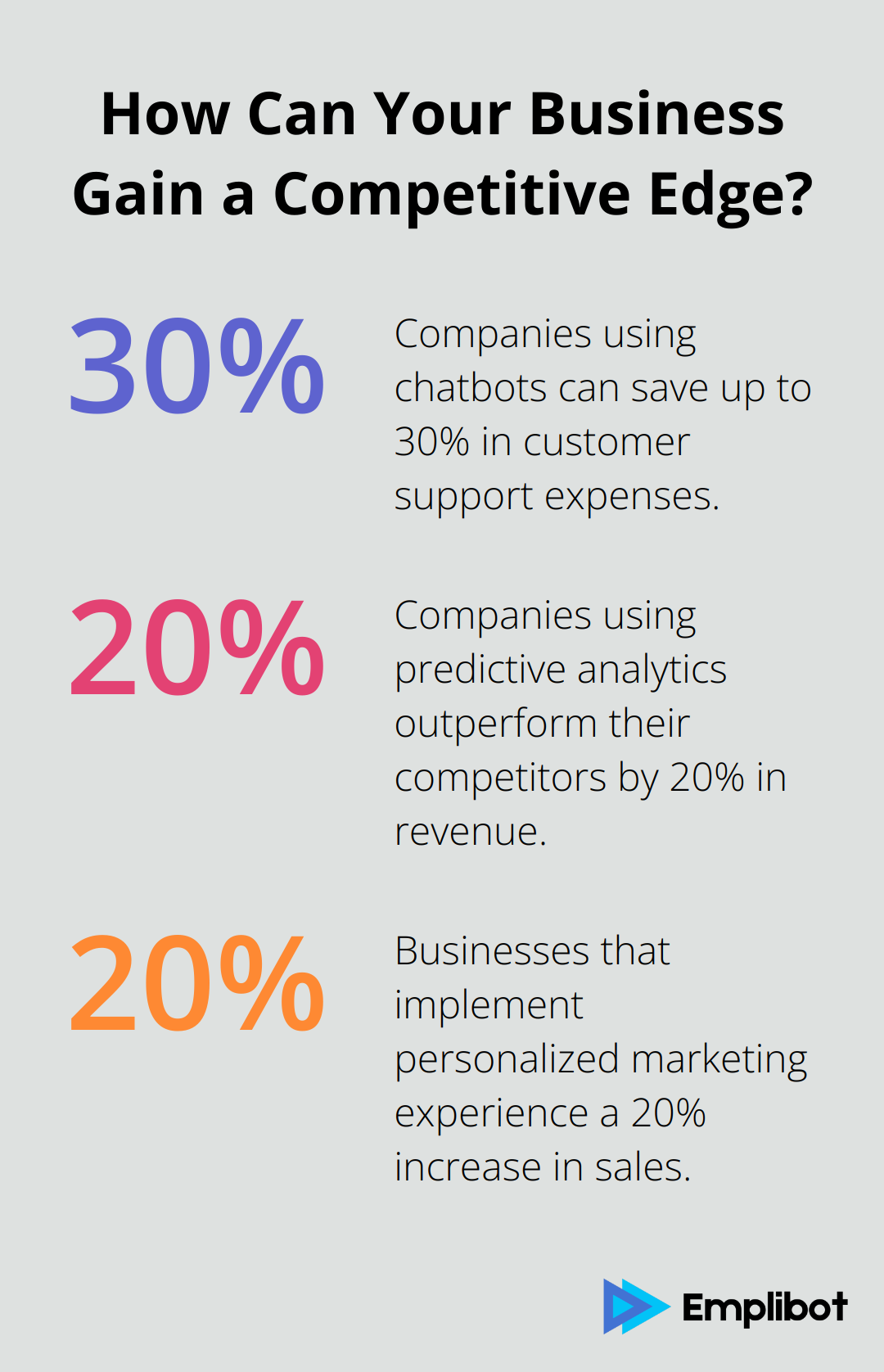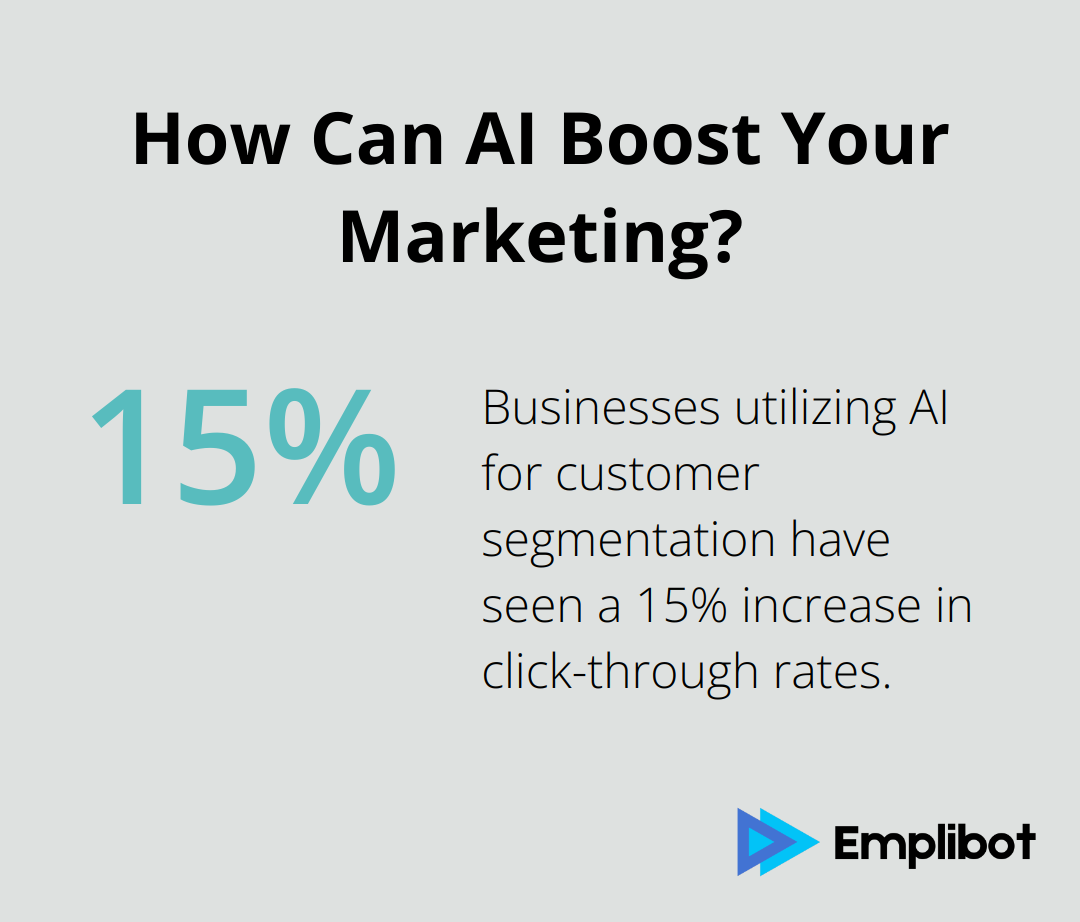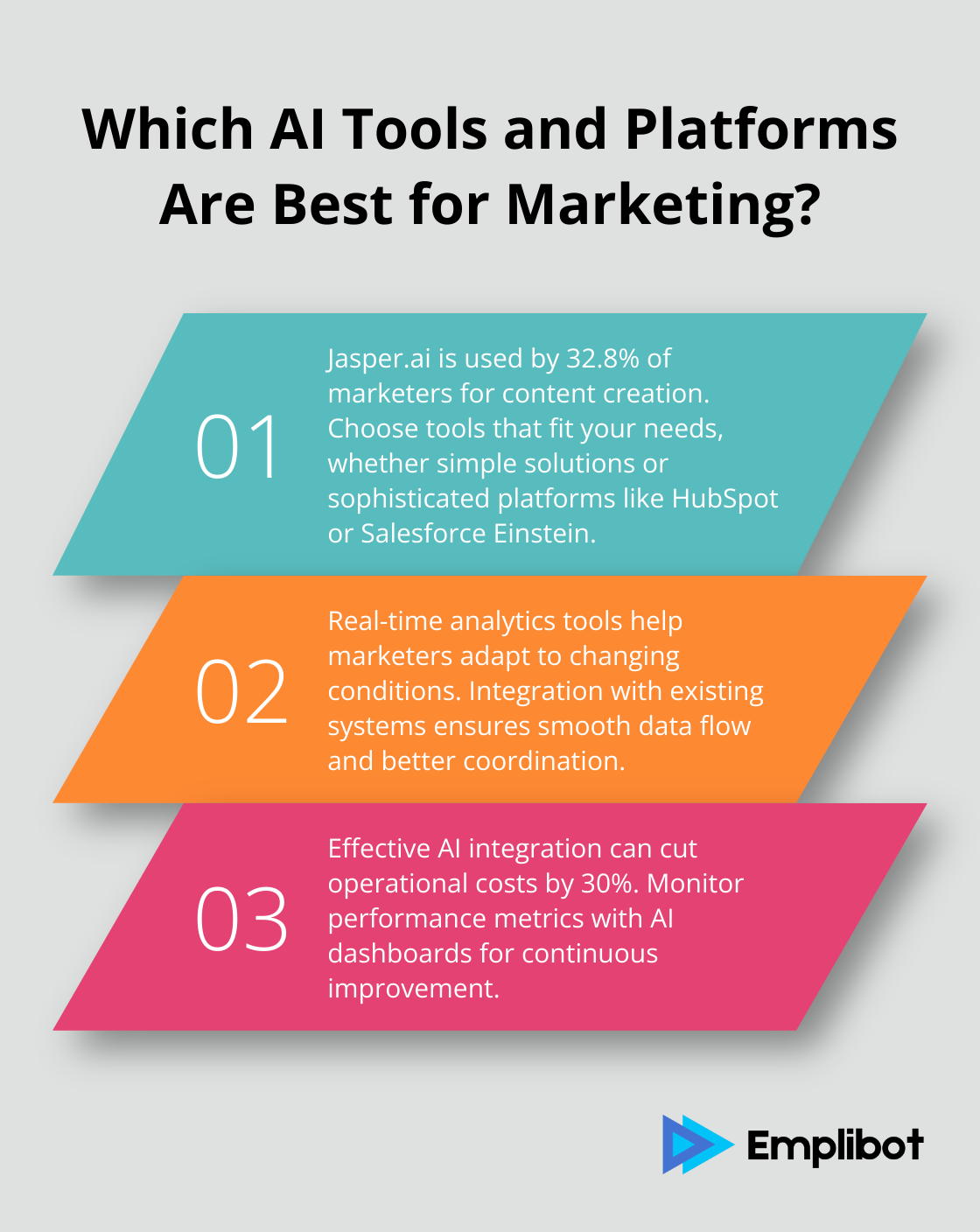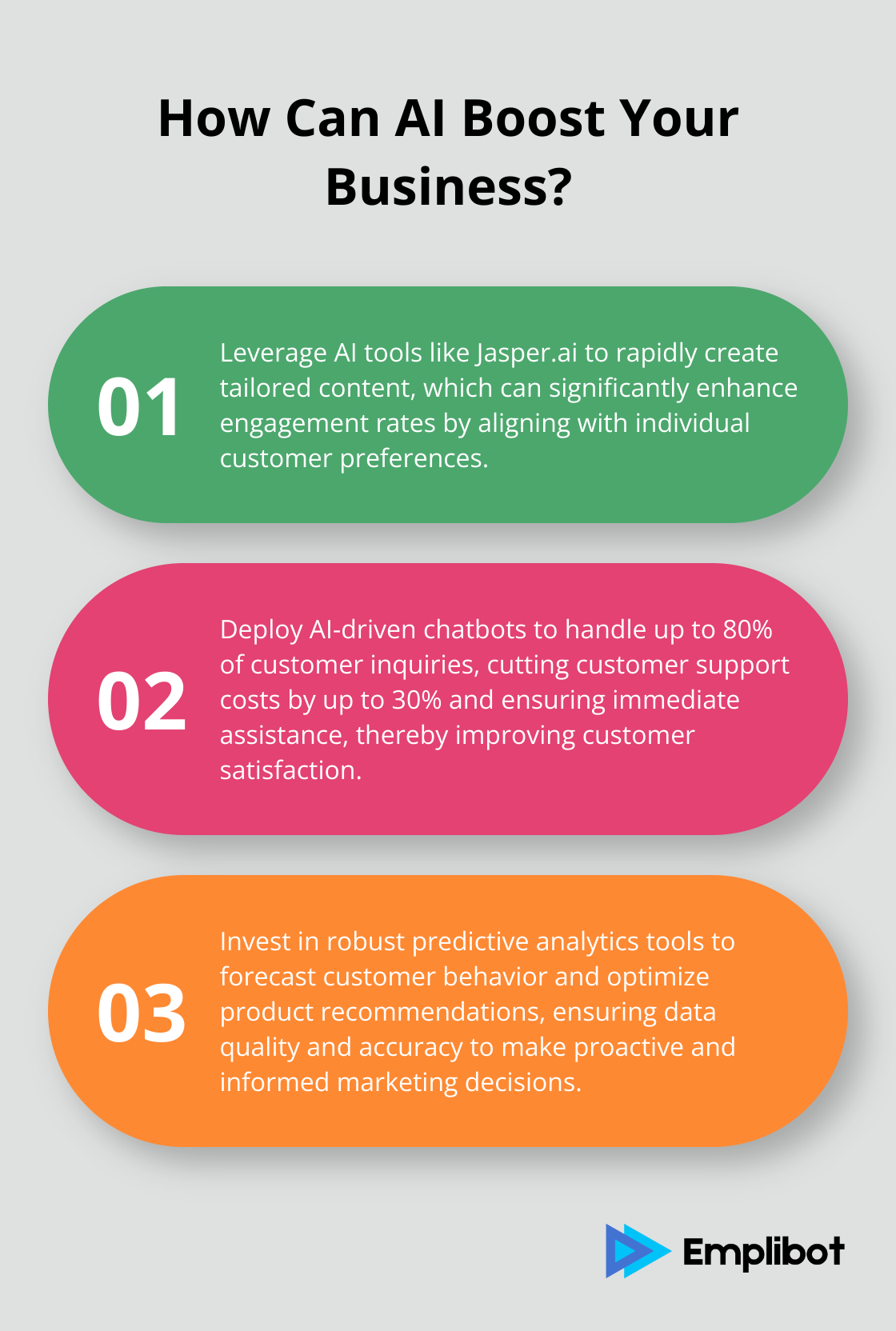AI is revolutionizing marketing, driving significant changes in how businesses engage with customers and make data-driven decisions.
We at Emplibot have seen a remarkable shift towards personalized campaigns, chatbots, and predictive analytics.
In this blog post, we will share the latest benchmarks and practical strategies for implementing AI in your marketing efforts for 2024.
Contents
ToggleWhat Are the Current AI Marketing Trends?
AI marketing trends are reshaping how businesses operate, and staying updated is key to leveraging these advancements effectively.
Growth in Personalized Marketing Campaigns
Personalization is no longer optional; it’s a necessity. 61.4% of marketers have integrated AI into their marketing activities, with 44% specifically using it for content production. AI-driven personalization allows marketers to create highly customized campaigns that resonate with individual customer needs. For instance, AI tools like Jasper.ai enable businesses to generate tailored content rapidly, significantly enhancing engagement rates.

Adopting AI for personalization isn’t just a trend but a proven strategy. According to research, businesses that implement personalized marketing experience a 20% increase in sales. The key to effective personalization lies in leveraging customer data to understand preferences accurately. Marketers should focus on collecting high-quality data from various touchpoints and employ AI algorithms to analyze this data for insights.
Use of Chatbots and Virtual Assistants
Chatbots and virtual assistants have become indispensable in providing real-time customer support. These AI tools manage customer queries round the clock, ensuring customers receive immediate assistance. Chatbots can handle up to 80% of customer inquiries without human intervention, which drastically reduces response times and operational costs.
Statistics show that companies using chatbots can save up to 30% in customer support expenses. Furthermore, integrating chatbots into your customer service strategy improves customer satisfaction. Marketers should consider deploying AI-driven chatbots and continuously update them based on customer feedback to enhance interactions. For more insights on this, check out our guide on conversational AI marketing.
Increasing Role of Predictive Analytics
Predictive analytics is revolutionizing decision-making processes in marketing. 54.5% of marketers believe that AI significantly enhances their marketing efforts by providing predictive insights. This technology anticipates future trends based on historical data, enabling businesses to make proactive and informed decisions.
For example, predictive analytics can help forecast customer behavior, optimizing product recommendations and marketing messages. A study found that companies using predictive analytics outperform their competitors by 20% in revenue. To make the most of predictive analytics, marketers should invest in robust data analytics tools that integrate seamlessly with their existing systems. Ensuring data quality and accuracy will be crucial in deriving actionable insights.
Embracing these AI marketing trends is not optional but necessary for businesses aiming to stay competitive. By focusing on personalized marketing campaigns, leveraging chatbots, and utilizing predictive analytics, businesses can achieve significant improvements in customer engagement and operational efficiency. For detailed strategies on applying these trends, explore our post on marketing automation trends.
What Are the Key AI Marketing Benchmarks in 2024?
Tracking the right benchmarks is vital for maximizing the impact of AI in marketing. Here are the essential metrics businesses should focus on:
Customer Engagement Rates
Understanding how customers interact with your brand is crucial. AI tools can provide deeper insights into engagement rates, showing which content resonates most with your audience. For example, businesses utilizing AI for customer segmentation have seen a 15% increase in click-through rates. By analyzing which types of content perform best, marketers can tailor their strategies to enhance engagement. Practical steps include regularly reviewing engagement analytics and adjusting content strategies based on the data. Using tools like AI-powered social media analytics can offer precise insights.
Conversion Rate Improvements
AI significantly boosts conversion rates by optimizing every customer touchpoint. Marketers using AI-driven personalization can achieve conversion rates up to 20% higher than those relying on traditional methods. Predictive analytics plays a crucial role here by anticipating customer needs and delivering personalized recommendations. Businesses should invest in high-quality predictive analytics platforms that integrate seamlessly with their CRM systems. Monitoring AI performance can reveal which tweaks result in the highest conversion rates, helping to refine strategies continuously. For more tips, explore strategies on conversion optimization.
Cost Efficiency Metrics
AI’s cost-saving potential cannot be overstated. By automating repetitive tasks and optimizing resource allocation, AI can cut marketing costs significantly. Companies using chatbots, for example, can save up to 30% in customer service expenses. It’s also reported that larger AI investments correlate with greater cost efficiencies, as evidenced by nearly 20% of marketers spending over 40% of their budget on AI-driven campaigns. A key to achieving cost efficiency is to continuously measure ROI by tracking metrics such as cost per lead and cost per conversion. Investing in comprehensive AI marketing dashboards can simplify this process and offer real-time insights into cost efficiency.

By focusing on these benchmarks, businesses can harness AI to not just meet but exceed their marketing goals.
How to Implement AI in Your Marketing Strategy
Choosing the Right AI Tools and Platforms
Selecting the best AI tools and platforms is key to successful AI marketing integration. Tools like Jasper.ai have seen widespread adoption, with 32.8% of marketers using them for content creation. But the tool should align with your specific needs. Consider the scale of your operations and the type of data you handle. Smaller companies might find value in simple, out-of-the-box solutions, while larger enterprises may need more sophisticated AI platforms like HubSpot or Salesforce Einstein for custom integrations.

Furthermore, look for tools that offer real-time analytics. Real-time data enables marketers to quickly adapt to changing market conditions, enhancing overall campaign responsiveness. Tools that integrate seamlessly with your existing systems, like CRM and email marketing platforms, ensure smooth data flow and better coordination.
Integrating AI with Existing Systems
Integrating AI with existing systems can be challenging but is essential for maximizing its potential. Focus on interoperability. Ensure your AI solution can communicate with your CRM, email marketing, and social media platforms for a holistic approach. For instance, AI-driven customer segmentation tools should directly feed data into your email marketing platform to automate personalized email campaigns.
Effective integration can lead to significant cost and time savings. For example, integrating AI chatbots with customer service platforms can reduce operational costs by 30%. This efficiency allows your team to focus more on strategic tasks rather than repetitive ones. Continuous monitoring is crucial; use AI dashboards to track performance metrics and identify areas for improvement. You can find more practical tips on integrating AI in marketing with multi-channel marketing.
Best Practices for Data Collection and Analysis
High-quality data is the cornerstone of any successful AI marketing strategy. Prioritize first-party data collection from your own touchpoints like websites, social media, and CRM systems. First-party data is more reliable and compliant with privacy regulations compared to third-party data.
Analyzing this data using AI can dramatically improve marketing outcomes. For example, businesses that leverage AI for data analytics outperform their peers by 20% in revenue. Ensure that your data collection methods are robust and consistent. Use AI-powered tools to clean and analyze data, ensuring its accuracy and relevance.
Predictive analytics plays a vital role here. By analyzing historical data, predictive analytics models can forecast customer behavior, allowing for proactive marketing strategies. Ensure you have skilled specialists to interpret data and derive actionable insights. To effectively implement these strategies, consider reading about more advanced data analytics techniques.
Applying these practical steps can significantly enhance your AI marketing efforts, making your campaigns more efficient and effective.
Conclusion
AI marketing benchmarks for 2024 reveal a landscape where personalization, chatbots, and predictive analytics are driving significant advancements. Personalized campaigns have become essential, with 61.4% of marketers integrating AI into their strategies, boosting sales by 20%. The use of chatbots for customer service can cut costs by up to 30%, and predictive analytics is helping businesses outperform their competitors by 20%.

Implementing AI in marketing involves choosing the right tools, ensuring seamless integration with existing systems, and prioritizing high-quality data collection. Tools like Jasper.ai and robust platforms like HubSpot and Salesforce Einstein cater to diverse needs, offering capabilities from content creation to real-time analytics. Effective integration of AI-driven solutions into your CRM, email, and social media platforms ensures a unified approach, leading to cost and time savings. Prioritizing first-party data collection, using predictive analytics, and employing skilled specialists for data analysis are essential for actionable insights.
In 2024, staying competitive means fully embracing AI trends and leveraging them to enhance customer engagement and operational efficiency. Regularly tracking key benchmarks such as engagement rates, conversion rates, and cost efficiency will help businesses maximize their AI marketing potential. By proactively adopting these strategies, businesses can position themselves for success in an increasingly AI-driven market.
For those looking to automate and optimize their content strategies, Emplibot offers a comprehensive solution. Emplibot publishes SEO-friendly articles to your WordPress site automatically, including keyword research, images, and internal linking. Explore more at Emplibot.com and see how your business can benefit from building a blog 100% automatically.
For further reading on the latest AI trends, consider insights on content marketing statistics and marketing analytics.










 Rated Excellent 4.5
Rated Excellent 4.5